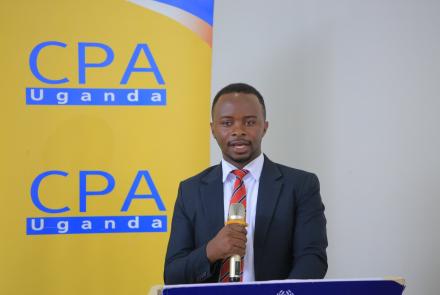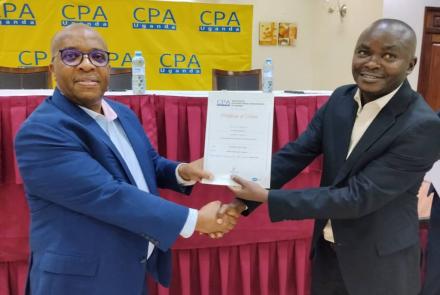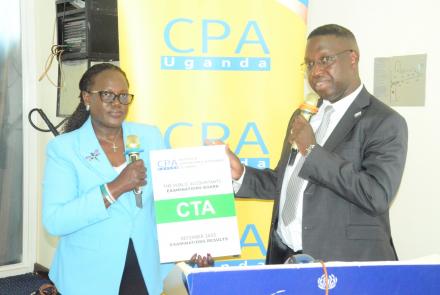By Jackline Nabirye
Communications Officer,
ICPAU
Uganda’s journey towards sustainable economic transformation must start with a shift in how the nation views waste and wealth. This was the message from Peter Okwoko, co-founder and co-CEO of Takataka Plastics as he addressed participants at the 13th CPA Economic Forum. Okwoko was delivering a presentation on circular economy, rethinking waste to create wealth.
Okwoko challenged accountants, policymakers, and business leaders to rethink economic models and champion the transition from a linear to a circular economy.
A circular economy, he explained, is an economic system where waste is eliminated, products and materials are kept in continuous use, and nature is regenerated. It is a complete shift from the traditional take–make–dispose model that has dominated global economies and depleted the planet’s resources. In Uganda, this approach is urgently needed, as the country produces more than 600 tonnes of plastic waste every day.
“Alarmingly, only 6% of this waste is collected and recycled, while the rest is burned or dumped, polluting the environment and endangering public health,” he added.
Okwoko highlighted the paradox Uganda faces, that, while plastic waste piles up in communities, thousands of young Ugandans remain unemployed.
“Over 400,000 youth enter the job market each year, competing for fewer than 10,000 available formal jobs,” he noted.
By transforming plastic waste, especially problematic PET plastic bottles, into valuable products like construction tiles and school slates, Takataka is building a local circular economy in Gulu City. This model not only creates jobs but also helps to clean the environment and restore dignity to youth who have faced post-war trauma and poverty. Every tile and slate produced removes harmful waste from the environment and creates a tangible economic product that benefits the community.
However, Okwoko was clear that social enterprises alone cannot carry this burden. He called upon policymakers to craft enabling legislation that supports recycling and circular economy initiatives. This includes offering tax incentives for companies engaged in recycling, removing import duties on specialised recycling equipment not available locally, and creating green innovation grants that encourage entrepreneurship in the sustainability sector. He also emphasised the need for clear product certification standards to boost consumer and investor confidence in recycled products.
He urged professionals to go beyond traditional financial reporting and embrace sustainability accounting, Environmental, Social, and Governance (ESG) frameworks.
“You hold the key to unlocking investment in circular economy businesses by quantifying the financial and societal benefits of sustainability,” he urged.
By helping businesses measure and report their environmental impact, accountants can drive informed decision-making and responsible investment.
Okwoko’s call to action was simple yet profound: Uganda’s economic growth cannot be built on a foundation of waste. Instead, waste must be viewed as a resource, an opportunity for innovation, and a pathway to inclusive prosperity. He reminded participants that in today’s global economy, circular models are driving growth in leading nations and creating resilient economies capable of withstanding environmental and social challenges.
He invited accountants, business leaders, and policymakers to take ownership of Uganda’s circular economy future. He challenged them to rethink their roles in society, not just as economic actors but as custodians of the environment and champions of social transformation.
“The time for action is now. Uganda’s accountants and policymakers have the tools and influence to turn this vision into reality,” he emphasised.
The 13th CPA Economic Forum is taking place from 9 to 11 July 2025 at the Imperial Resort Beach Hotel in Entebbe and virtually. The forum brings together thought leaders, government officials and industry professionals to craft practical solutions aimed at driving Uganda’s long-term economic sustainability. Key outcomes from the forum will be presented to the Ministry of Finance, Planning and Economic Development, reflecting the accounting profession’s contribution to shaping national economic policies.
The forum is supported by key partners including Bank of Uganda, PKF Uganda, National Social Security Fund (NSSF), National Agricultural Research Organisation (NARO), Uganda Printing & Publishing Corporation, Electoral Commission, Uganda Electricity Generation Company Limited (UEGCL), Stanbic Bank, Centenary Bank, MTN Uganda and Prudential Uganda.
END



